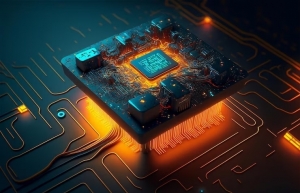Intel abandons $5.4 bn deal to buy Israel's Tower Semiconductor
| Intel abandons $5.4 bn deal to buy Israel's Tower Semiconductor, illustration photo/ Source: freepik.com |
Regulators in China were apparently the obstacle, having shown no sign of approving the merger which had been agreed on early last year, according to a Bloomberg report.
Intel will pay Tower a $353 million termination fee as per terms of the agreement, the companies said in a release.
"Tower was very excited to join Intel to enable Pat Gelsinger's vision for Intel's foundry business," chief executive Russell Ellwanger said, referring to his counterpart at Intel.
"We appreciate the efforts by all parties."
Tower and Intel agreed to abandon the deal after there were "no indications regarding certain regulatory approval" by the merger contract deadline on Tuesday, according to the companies.
"Our respect for Tower has only grown through this process, and we will continue to look for opportunities to work together in the future," Intel chief Pat Gelsinger said in a release.
Intel stood to strengthen its portfolio of chip manufacturing services with the merger, as Tower specializes in analog semiconductors used in cars, medical devices and security cameras.
Intel shares were down nearly 3 percent to $33.76 in afternoon trading in New York.
The reported stalling by Chinese regulators comes amid rising strains in the US-China relationship, with the semiconductor industry a central point of contention.
California-based Intel is seen as a key tool for the United States to reduce its dependence on major global producers, such as Taiwan's TSMC.
US President Joe Biden last week issued an executive order aimed at restricting certain American investments in sensitive high-tech areas in China.
The long-anticipated rules, expected to be implemented next year, target sectors like semiconductors and artificial intelligence.
The program is set to prohibit new private equity, venture capital and joint venture investments in advanced semiconductors and some quantum information technologies in China, according to the Treasury Department.
China's foreign ministry blasted the move as an attempt to "engage in anti-globalization and de-sinicization," warning that China would "resolutely safeguard its own rights and interests."
 | Intel, Samsung hammered as chips demand plummets The crucial semiconductor industry, that powers everything from personal computers, smartphones to fighter jets, suffered a dismal first quarter as demand plummeted for chips. |
 | Intel tapping into digital transformation US tech giant Intel is driving innovation to enable its customers to unleash the potential of digital tech. Simon Chan, managing director of Intel’s Sales, Marketing & Communications Group for Southeast/South Asia, Australia, and New Zealand, talked to VIR’s Bich Thuy about its strategy and plans to become a chip champion once again. |
 | Intel to pour more investment in Vietnam Intel Corporation will continue to invest in Vietnam, Kim Huat Ooi, Vice President in Manufacturing, Supply Chain and Operations, and General Manager of Intel Products Vietnam told Tuoi Tre (Youth) Newspaper. |
What the stars mean:
★ Poor ★ ★ Promising ★★★ Good ★★★★ Very good ★★★★★ Exceptional
Related Contents
Latest News
More News
- State corporations poised to drive 2026 growth (February 03, 2026 | 13:58)
- Why high-tech talent will define Vietnam’s growth (February 02, 2026 | 10:47)
- FMCG resilience amid varying storms (February 02, 2026 | 10:00)
- Customs reforms strengthen business confidence, support trade growth (February 01, 2026 | 08:20)
- Vietnam and US to launch sixth trade negotiation round (January 30, 2026 | 15:19)
- Digital publishing emerges as key growth driver in Vietnam (January 30, 2026 | 10:59)
- EVN signs key contract for Tri An hydropower expansion (January 30, 2026 | 10:57)
- Vietnam to lead trade growth in ASEAN (January 29, 2026 | 15:08)
- Carlsberg Vietnam delivers Lunar New Year support in central region (January 28, 2026 | 17:19)
- TikTok penalised $35,000 in Vietnam for consumer protection violations (January 28, 2026 | 17:15)

 Tag:
Tag:



















 Mobile Version
Mobile Version